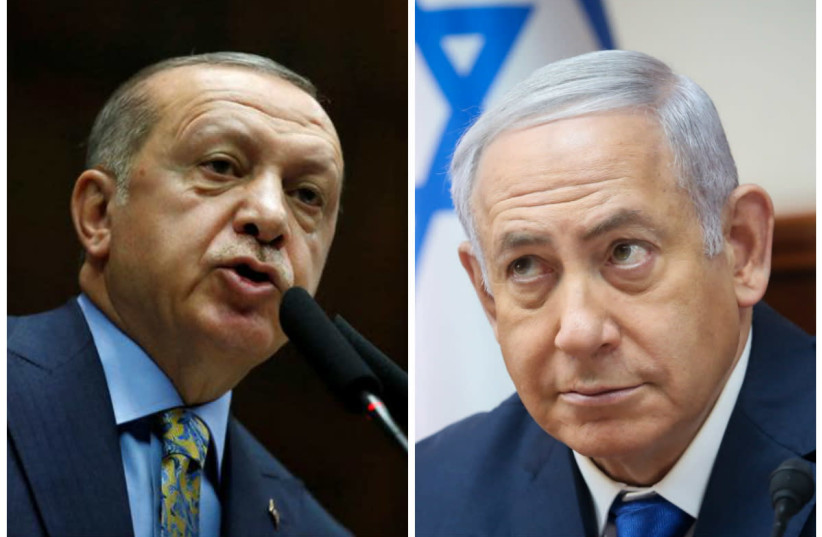Netanyahu knows Erdogan can’t be trusted – opinion
Prime Minister Benjamin Netanyahu’s first-ever meeting with Turkish President Recep Tayyip Erdogan last week might seem like a welcome sign of thawing between the long-strained countries.
After years of bad blood, the two leaders spoke on the sidelines of the United Nations General Assembly about efforts to normalize Saudi-Israeli relations and other issues. Erdogan later met with a group of Jewish leaders, denouncing antisemitism as a “crime against humanity.”
It was a different story than past Erdogan visits to New York, like when he compared Israeli actions in Gaza to the Holocaust and cast Israel’s history as an attempt to wipe out the Palestinians.
“Our ties are growing stronger,” Netanyahu declared Tuesday, picking up from where his predecessor Yair Lapid left off in trying to mend bilateral relations.
In reality, this is exactly the narrative Turkey’s strongman hopes to tell – and Netanyahu has every reason to see straight through it.

Serving as Israeli prime minister both during the peak of Turkish relations in the 1990s and at their lowest point in the 2010s, few world leaders have had a better view of Erdogan’s lack of scruples and his destructive ideology.
But, if he needed a reminder: Israeli authorities revealed last week that they discovered 16 tons of rocket-making material hidden in a shipment from Turkey bound for the Hamas terror group in Gaza, which has long counted on support from Ankara.
For the moment, cozying up to Netanyahu is convenient for Erdogan. But as soon as it suits him, Turkey’s president won’t hesitate to again turn his back on Israel, regardless of whether it serves his people’s interests.
Reasons for reconciliation
What’s behind the current reconciliation? In part, Erdogan needs all the help he can get, facing economic pressures, public dissatisfaction, and a slew of regional challenges. Friendly relations with Israel are now expedient: offering strategic muscle, a boost of tourism, and an olive branch for the Biden administration.
Fresh off Erdogan’s closest election race ever – in which he could not muster a first-round majority – American support has become especially precious (and that means being nice to America’s allies).
But, as Netanyahu knows firsthand, Erdogan has spent much of his two decades in office trying to turn the Jewish state from a potential friend of Turkey into a public enemy, fueling anti-Israel and antisemitic hostility.
The two nations have little underlying reason for animosity. In 1949, Turkey became the first Muslim-majority state to recognize Israel. Amid the peace process of the 1990s, they saw greater cooperation across trade, military, tourist, cultural, and humanitarian areas, as their citizens grew closer than ever.
ERDOGAN’S RISE to power in 2003 set a fuse that would help ignite those ties, just as it has done to many of Turkey’s prospects. While relations remained friendly for a time, Erdogan seized on Israel’s 2008-2009 military operation in the Gaza Strip, leading a charge of international censure.
The next year, he broke off relations over the Mavi Marmara incident. Instead of working with Israeli authorities to provide genuine humanitarian aid to Gaza, Erdogan got the crisis he wanted.
By 2013, just 2% of Turks told pollsters they had a favorable view of Israel, the lowest mark for any country. Although Netanyahu apologized for the flotilla incident and saw relations restored, things would later escalate again – with Erdogan comparing the Jewish state to Nazi Germany and Netanyahu to Hitler, and recalling Turkey’s ambassador after the US embassy move to Jerusalem.
Perhaps more destructive, is Erdogan’s support for Hamas, which for years has looked to Ankara for political, financial, and logistical backing. Turkey has hosted Hamas leaders, granted passports to known terrorists, and has even welcomed an Istanbul headquarters for the group since 2014. This past May, Turkey claimed it busted an 11-person Mossad cell operating in the country to surveil Iranian threats.
At the cultural level, Erdogan’s attempt to infuse Turkish society with his strain of Islamist ethno-nationalism has not spared Israel. IMPACT-se, an Israel-based nonprofit that studies educational materials in the region, finds that the Turkish curriculum has been “significantly radicalized” in recent years – with Christians and Jews portrayed as “infidels” and a demonization of Zionism that verges on antisemitism. Erdogan’s own son-in-law has himself financed antisemitic conspiracy materials about Jews and Israel, helping fuel a poisonous media environment.
As one of too many Turks who has faced personal retribution for speaking out against Erdogan, I know that Israel has no easy choices. It lives in a tough neighborhood, and has legitimate reasons to engage with Turkey, sharing areas of concern like energy, security, and the environment. More thawing is already in the works, with Erdogan describing plans for a visit to Jerusalem.
Yet the defense of democracy and human rights doesn’t always have to conflict with national interests. For Israel, both would be better served if its leaders remember who they are dealing with in Erdogan – a brutal dictator who can’t be trusted as far as the narrowest point on the Bosporus.
The writer is a human rights activist and professional basketball player.





Comments are closed.